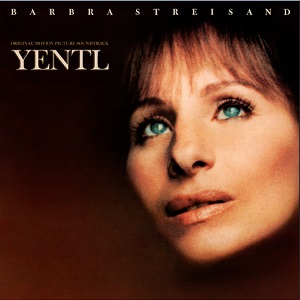by Chris Feil
 Some might reduce it to simple star vehicle, but Yentl does something quite uncommon within the musical genre: through song, it places us in the mind and isolation of exclusively one character. All of the songs belong to Barbra Streisand’s protagonist Yentl, locked in the chamber of her mind, until it triumphantly breaks out in her reality. It might seem criminal to have the likes of her costar Mandy Patinkin going songless despite being at his Evita and Sunday in the Park with George-era peak, and maybe more condescending viewers would chalk this up to ego on the part of Streisand. But the effect gives us something that quietly defies musical convention, turning song into metaphor and providing richer payoff to the character arc. It’s only a musical inside the head of our heroine, a way of reflecting the strictures that limit her voice.
Some might reduce it to simple star vehicle, but Yentl does something quite uncommon within the musical genre: through song, it places us in the mind and isolation of exclusively one character. All of the songs belong to Barbra Streisand’s protagonist Yentl, locked in the chamber of her mind, until it triumphantly breaks out in her reality. It might seem criminal to have the likes of her costar Mandy Patinkin going songless despite being at his Evita and Sunday in the Park with George-era peak, and maybe more condescending viewers would chalk this up to ego on the part of Streisand. But the effect gives us something that quietly defies musical convention, turning song into metaphor and providing richer payoff to the character arc. It’s only a musical inside the head of our heroine, a way of reflecting the strictures that limit her voice.
The film plays tells us that this is precisely what it’s doing in the very first number, “Where Is It Written?” First, we see Yentl alone and Streisand sings of the religious, gendered confines that prevent her from studying the Talmud outside of her home. But when she enters her father’s quarters, and more importantly enters her Jewish community’s religious center, the song becomes musical voiceover. Her desire for religious study is more than a deep longing, it’s a secret to be hidden.
The internal music of Yentl also serves its own religious function. Because of the story’s context, the interiority of Yentl’s singing naturally lends all of her musical self-reflections to also play as prayer. Composers Michel Legrand, Alan Bergman, and Marilyn Bergman had intended the score to reflect the call-backs within the Talmud, and this flow between songs earned them an Oscar for their religious insight. But Yentl’s songs don’t quite become as much of a literal prayer as much as in the film’s most iconic song “Papa Can You Hear Me?”, a summoning of strength from her two deepest connections.
Sexuality is also incredibly important to Yentl’s personal journey, and the film draws as much conclusions about the oppressions of male culture as it does about our spectrum of sexuality. Yentl doesn’t simply experience spiritual freedom but also a sexual awakening as she lusts over her friend, Mandy Patinkin’s Avigdor. And the film is aware that sexuality is as much about the body as the soul. “The Way He Makes Me Feel” essentially plays out as a masturbation song, a musical form of a most private act. With Patinkin a stone cold fox in the film, you can understand Yentl’s torment.
The film pulls all of Yentl’s journey, and pieces of the melodies of the previous songs, into a triumphant finale of self-expression and self-assuredness in “Piece of Sky”. But what is most satisfying is that Yentl is singing out in the open. Even if this is fantasy (no one seems to notice this woman openly singing on this boat), the suggestion of the sequence is freedom. She sings of only being able to see just a piece of sky, a limited world of opportunity, but now her view is nothing but. Yentl is determined, but before anything, she is liberated.
All Soundtracking installments can be found here!